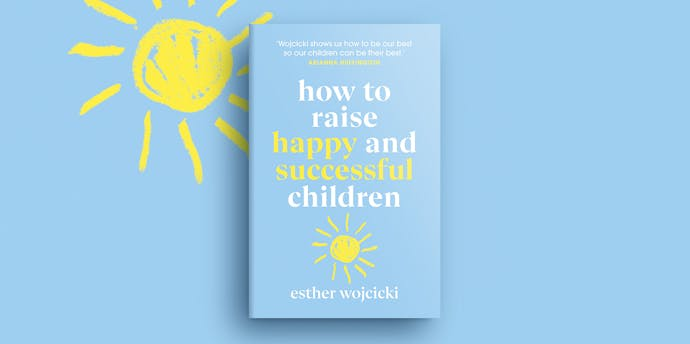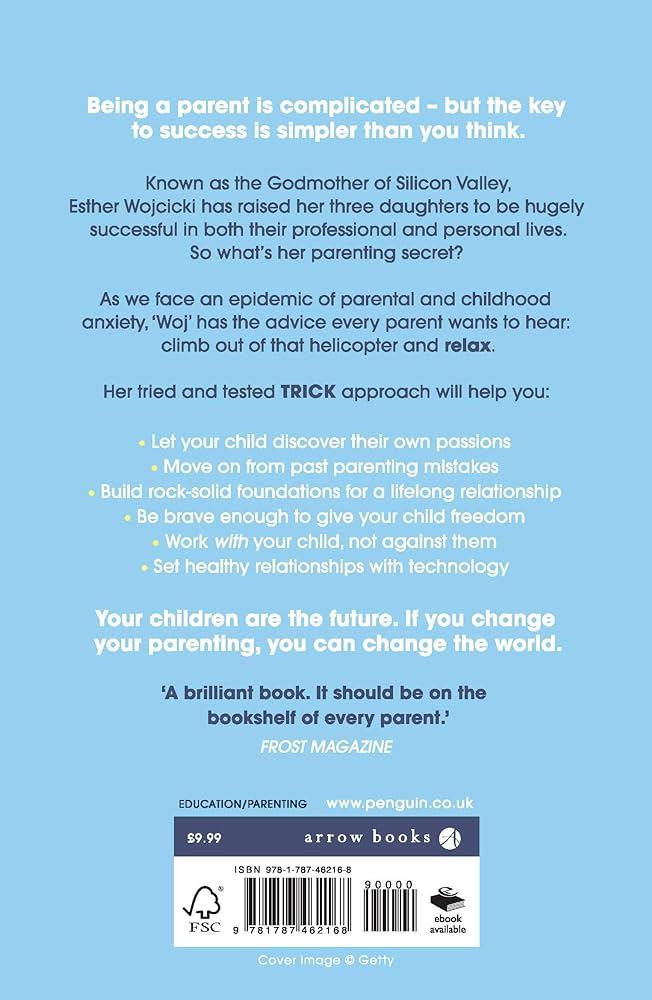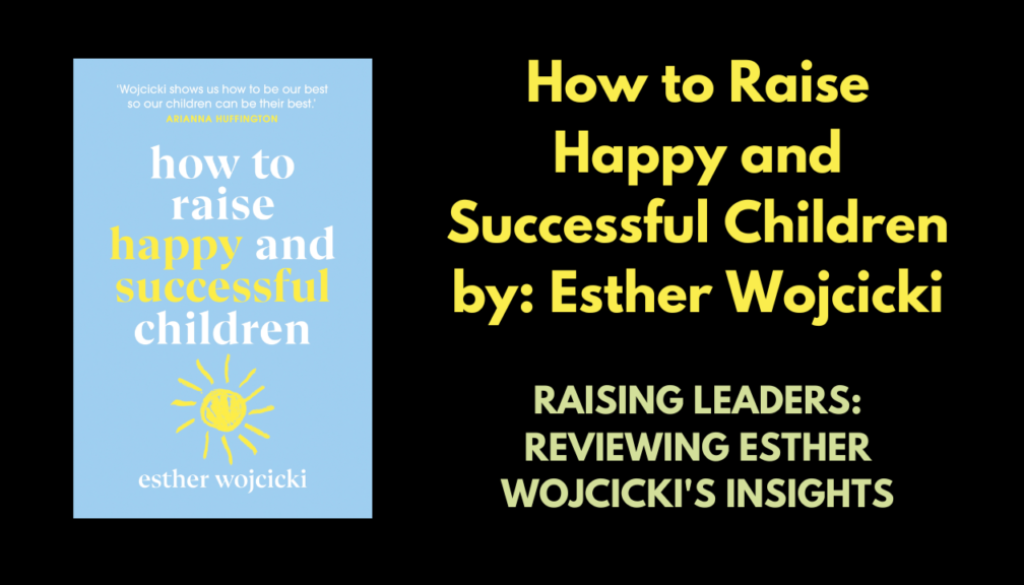Raising Leaders: Reviewing Esther Wojcicki’s Insights
Last Updated on 4. Dec 2024 by b2bexport
Parenting is an art and a science, and in her groundbreaking book, How to Raise Happy and Successful Children by Esther Wojcicki serves as both an artist and a scientist.
This book offers a refreshing blend of practical advice and philosophical guidance based on Wojcicki’s extensive experience as an educator and mother. Her TRICK philosophy—Trust, Respect, Independence, Collaboration, Kindness—provides families with a modern scaffold for raising self-reliant, accomplished, and emotionally intelligent children, promising radical results in transforming traditional parenting paradigms.
Herein lies a detailed exploration of each component of TRICK, enriched with anecdotes and actionable advice that promises to transform traditional parenting paradigms.
The ultimate goal is to raise children who grow up to be happy and successful people, ensuring they have unlimited opportunities to follow their dreams hard work, and achieve peace and happiness.

Trust: Laying the Foundation
Trust is more than a virtue in Wojcicki’s parenting playbook; it is the bedrock upon which all other values rest.
Wojcicki advocates for a parenting style where trust is extended as a basic courtesy from a young age, encouraging children to make choices and take responsibility for those choices. This section of the book delves into the psychological benefits of trusting your child with small, age-appropriate tasks, which gradually scale up as the child matures. Trust helps children relate to others and build empathy, fostering essential people skills and emotional intelligence.
She uses examples from her daughters and own life, describing how she allowed her daughters the freedom to plan their homework and leisure time, which taught them valuable time management skills and self-discipline.
Respect: Acknowledging the Individual
Respect is the lens through which children view themselves and others, and Wojcicki highlights its significance in shaping a child’s identity and interpersonal relationships.
She argues that parents who listen to their children’s ideas, feelings, and emotions without judgment send a powerful message of acceptance. This respect and acceptance are crucial for improving a child’s self-esteem. This section is particularly insightful, offering strategies like “active listening” and “empathetic dialogue.”
Wojcicki shares stories from her teaching career where respect in the classroom led to improved student engagement and performance, suggesting that the same principles apply just as effectively at school and home.
Independence: Fostering Growth and Self-Esteem
Independence is not just about doing things alone; it’s about making informed decisions and standing by them.
Wojcicki emphasizes the importance of fostering an environment where children feel safe to express their thoughts and pursue their interests. Fostering independence can be achieved through simple lessons and practical steps. This part of the book provides practical steps for parents to scaffold their child’s independence, from choosing their clothes to more significant decisions like selecting extracurricular activities.
The narrative includes a compelling argument for setting boundaries that are firm yet flexible, allowing children the space to explore within a secure framework.
Collaboration: Building Teamwork Skills
In today’s interconnected world, collaboration is a skill as critical as any academic endeavor.
Wojcicki addresses how teamwork starts at home and extends beyond it. She proposes family projects that necessitate collaboration, such as planning a family outing or managing a household task together. These collaborative family projects contribute to raising happy kids by fostering a sense of accomplishment and unity. Each example is backed by tips on how to encourage constructive communication and mutual respect among siblings.
The author also touches upon her professional experiences with collaborative learning, reinforcing its value in both academic and personal growth.
Kindness: Encouraging Empathy and Building Empathy
Kindness, according to Wojcicki, is the natural consequence of adults practicing trust, respect, independence, and collaboration. Kindness and empathy are essential for raising content children, as they form the foundation for a successful and fulfilling life.
This section explores how acts of kindness and empathy can be integrated into daily activities, thereby making them habitual. Wojcicki encourages parents to model kindness through community service and by openly addressing social issues, which cultivates a deep-rooted sense of empathy in children.
Illustrative anecdotes of her daughters’ engagements with friends and in volunteer work underscore the lifelong impact of early exposure to compassionate practices.
Practical Applications and Success Stories
Interspersed with the theoretical frameworks are chapters dedicated to real-life applications and testimonials.
Wojcicki recounts numerous success stories from her own family and her extended ‘family’ of students. Notably, she highlights the success of her three daughters, raised using her TRICK (Trust, Respect, Independence, Collaboration, and Kindness) philosophy. These narratives not only illustrate the effectiveness of her methods but also show how adaptable they are across different scenarios and challenges.
This section acts as a motivational parent discourse, aimed at both reassuring and inspiring parents who may be facing difficulties or doubts.
More about Esther Wojcicki
Esther Denise “Woj” Hochman Wojcicki is an American journalist, educator, and vice chair of the Creative Commons Advisory Council.
Wojcicki has an extensive background in education and technology. She founded the Media Arts Program at Palo Alto High School in Palo Alto, California.
Early Life and Education
Wojcicki is the eldest of three children and the first in her family to attend college.
Her parents, Russian Jewish immigrants, moved to New York City in the 1930s and later relocated to Southern California after her birth. Wojcicki was the valedictorian of her high school class and went on to study at the University of California, Berkeley, where she earned a B.A. in English and political science. She also obtained a secondary teaching credential and a master’s degree in journalism from Berkeley.
Additionally, she holds an M.A. in French and French history from the Sorbonne and both a secondary school administrative credential and an M.A. in educational technology from San Jose State University.
Personal Life
Wojcicki has three daughters: Susan, former CEO of YouTube; Janet, a Fulbright-winning anthropologist, assistant professor of pediatrics, and researcher; and Anne, co-founder of 23andMe. She also has ten grandchildren.

Photo of Esther Wojcicki: Wikipedia
Conclusion: A Holistic Approach to Raise Happy Kids
“How to Raise Happy and Successful Children” by Esther Wojcicki is more than a parenting book; it is a manifesto for the next generation of leaders, thinkers, and doers.
Esther Wojcicki, a renowned author and educator from Silicon Valley, shares her insights and experiences in raising three successful daughters. Wojcicki’s methods aim to raise successful people and happy children by fostering a nurturing and supportive environment.
Her TRICK philosophy—standing for Trust, Respect, Independence, Collaboration, and Kindness—is a testament to the potential of enlightened parenting approaches that respect, teach, and nurture the child’s individuality and agency.
This philosophy is rooted in decades of experience and a deep understanding of what it takes to raise successful people. As we conclude this book review, it’s clear that Wojcicki’s methods are both visionary and practical, suited for the complexities of modern parenting.
Her advice is grounded in reality, offering readers practical strategies to implement in their own lives.
Final Thoughts
For anyone at the parenting helm, navigating the choppy waters of child-rearing, Wojcicki’s book offers a compass that points towards empathy, respect, and understanding.
Happy parents play a crucial role in raising happy and ambitious children, as they realize their well-being directly impacts their children’s behavior and overall success. The lessons from her life, especially the upbringing of her daughters in Silicon Valley, provide a roadmap for success. Her approach doesn’t just prepare children for the trials of adulthood; it equips them with the emotional sophistication to lead happier, more fulfilling lives.
This book is an essential read for parents, educators, and anyone involved in child development, providing insights into the best books on parenting.
Esther Wojcicki’s “How to Raise Happy and Successful Children” is not just about raising children; it’s about shaping successful people who will change the world. The ideas presented are not just theories but are practiced realities that have led to the upbringing of three independent, successful daughters.
This book stands out as one of the best books on parenting, offering a blend of humor, wisdom, and practical advice. It encourages parents to have meaningful conversations, trust their children, and foster independence.
By reading this book, parents will find themselves better equipped to handle the challenges of parenting, ultimately leading to a better future for their children. In conclusion, “How to Raise Happy and Successful Children” by Esther Wojcicki is a must-read. Whether you are a parent, educator, or anyone interested in child development, this book provides invaluable insights and advice. It teaches the importance of empathy, respect, and understanding in parenting, preparing children to live happy and successful lives.
This book is a beacon for those looking to raise not just successful people but well-rounded, happy individuals.





